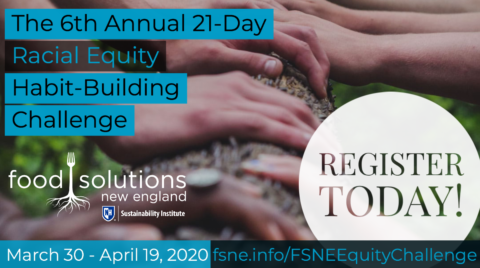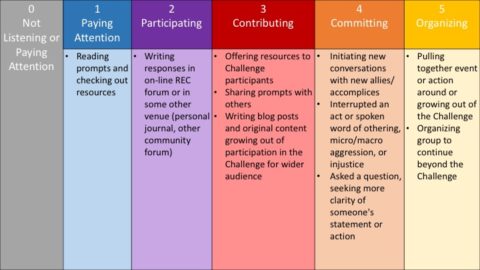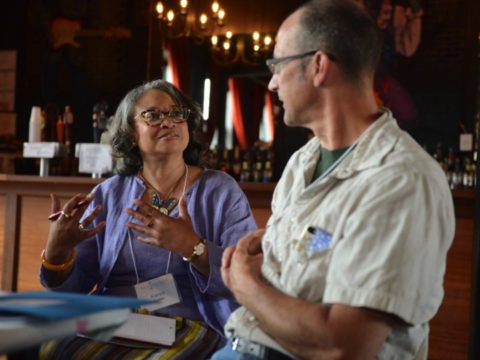The Evolving Story of a Network Innovation: FSNE’s 21 Day Racial Equity Habit Building Challenge
February 17, 2020 Leave a comment“I believe that the struggle for racial and social justice provides an unparalleled lens through which to visualize – and achieve – more honest, just, and positive interrelationships in all aspects of our lives together.”
– john a. powell, from Racing to Justice
On March 30, 2020, the 6th Annual Food Solutions New England (FSNE) Racial Equity Habit Building Challenge will launch. IISC is excited to continue our partnership with FSNE in offering the Challenge as a tool for advancing the conversation about and commitment to undoing racism and white supremacy in our food and related systems.
The FSNE Challenge is a remixed and more sector-specific form of an exercise created by Dr. Eddie Moore (founder of the Privilege Institute), Debbie Irving (author of Waking Up White), and Dr. Marguerite W. Penick-Parks (Chair of Educational Leadership and Policy at the University of Wisconsin Oshkosh). After FSNE formalized its commitment to racial equity in its sustainable food system work about 7 years ago (more on our journey in this article), a small design team saw the potential of using the Challenge to invite more widespread (networked!) conversation about the connection between race, racism and food systems and ultimately greater action for racial and food justice.
We also see the on-line version of the Challenge as a way of creating “network effects” around the justice work that many are already doing in our region and beyond through small world reach, rapid dissemination, adaptation, etc. Participation in and the complexity of the Challenge continue to grow – in 2015 we had 200 participants, mainly from the six state region of “New England,” and in 2019 we had some 5,000 people participate from all 50 states in the US, Canada, Mexico and other countries outside of North America.
The point of the Racial Equity Challenge is not simply to spread but also deepen the commitment to racial equity and food justice. So we hope that participants return each year, and many do, and also continue the work in between. Because of this, we make sure that the Challenge continues to evolve in content and format, increasingly with a bias towards action. A couple of years ago, seeing how things were developing, we created the “ladder of engagement” below to think about how to continue to move people along a continuum from “not paying attention” to “organizing.”
It has been inspiring to see numerous organizations self-organize to take the Challenge in-house, convening colleagues, fellow congregants, community members and classmates to reflect together on learning and making commitments to action. This has included groups such as Health Care Without Harm; the Wallace Center at Winrock International; Michigan State University’s Center for Regional Food Systems; Friedman School of Nutrition Science and Policy at Tufts University; Southside Community Land Trust (Providence, RI); Agricultural Sustainability Institute at University of California-Davis, Georgia Organics and many others who have convened around the Challenge.
Last year we responded to these organic efforts and some specific requests by creating a discussion guide for facilitators to design and steward conversations in their organizations/communities. In 2019, the Challenge also went deep in the home institution of Food Solutions New England, the University of New Hampshire (the Sustainability Institute serves as the network’s “backbone”). With the support of a Professorship that I shared with Karen Spiller, we did considerable “in-reach” to staff, faculty and students, including a launch event and campus presentations, which resulted in more than 500 people participating in the Challenge from UNH. We also turned the Challenge into workshops that we offered at gatherings such as the White Privilege Conference.
Last year, we heard for months after the Challenge many appreciations from different parts of the country and how participation is moving people from learning to action –
- to create a community equity summit
- to bring equity centrally into organizational strategy
- to shift one’s job so that they can focus more centrally on issues of injustice
- to bolster people’s courage to have courageous conversations
- to bring an equity focus to food policy work
We hope these ripples will continue to be amplified this year!
So what exactly is the Challenge?
It is a self-guided learning journey examining the history and impacts of racism how it is connected to our food systems, examples and tools on how to undo racism and build racial equity and food justice.
How does the Challenge work?
People sign up (YOU can register here) and then starting March 30th, they receive daily email prompts focused on a different theme along with links to related resources (readings, video, audio) that take about 10-15 minutes each day. In addition, there is a robust Resource List for people to look through and continue their learning. Those who register also have access to an online discussion forum for those who want to talk and think out loud about the daily prompts and other learning along the way.
How is the Challenge evolving in 2020?
To meet the growing demands of participants and the expressed desire for many to go deeper and to replicate and extend the Challenge in different ways, we have developed a variety of additional supports.
- In addition to an orienting webinar for participants, this year we will offer a webinar specifically for people who want to facilitate groups around the Challenge. This will happen on May 9th.
- We will also offer a one day in-person training for people who are interested in facilitating groups to prepare themselves for that undertaking.
- Another feature this year is a more robust Outreach Kit that has been pulled together by FSNE Communications Director, Lisa Fernandes. The Kit includes sample communications that can be used to recruit others to participate in the Challenge through email, social media (Twitter, Instagram and Facebook), as an outreach flyer.
- Related to outreach, and a late-breaking development, a US Representative in our region (whose name we cannot reveal yet) has agreed to tweet out daily prompts to her constituents via social media. How about inviting your elected officials to do the same!
- New this year – in collaboration with the New England Grassroots Environment Fund and the Garfield Foundation, we are excited to offer mini-grants up to $1,000 to organizations and groups based in any of the six New England states who need some financial support to meaningfully convene discussions or group conversations around this year’s Racial Equity Challenge. Funding can be used to cover expenses such as printing, room rental, refreshments, childcare and travel reimbursements for attendees of session(s), language translation/interpretation, etc. More information is available here.
- Also new this year, organizations (such as non-profits, agencies, schools, businesses and other groups) can register to be listed as “organizational participants” of the 21-Day Racial Equity Habit-Building Challenge! Each individual should still register with their own email address in order to receive the daily prompts during the Challenge, but organizations can now indicate to the world their support for the work of building equity and dismantling racism in our food system! Contact FSNE with any questions about this.
All of this is in line with how FSNE sees itself evolving as a network into its next decade, creating accessible and supportive resources that might be shared and easily adapted through aligned, diverse and robust connections in the region and beyond.
What next?
Please join us, and spread the word, the invitation, the conversation and the commitment to others!



